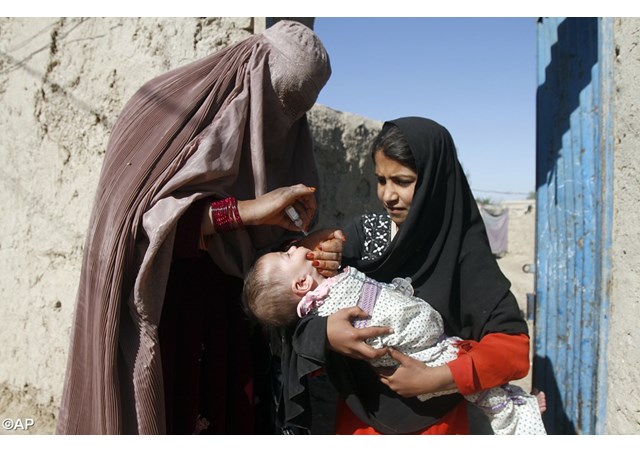
Afghanistan launches polio vaccination campaign

Afghanistan launched a 5-day campaign on Monday to vaccinate 8.8 million children against polio, in a effort to eradicate the virus in the country by the end of the decade. The March 27-31 campaign is the first of the National Immunization Days (NIDs) for polio eradication in 2017 by the Ministry of Public Health of Afghanistan. More than 7.9 million aged 6 months to 5 years will be given vitamin A tablets. The campaign will cover all provinces, except Bamyam, Daikonda and Ghor provinces due to cold weather.
Poliomyelitis or olio is a highly infectious disease caused by a virus which invades the nervous system, and can cause total paralysis in a matter of hours. The virus is transmitted by person-to-person spread mainly through the faecal-oral route or, less frequently, by a common vehicle such as contaminated water or food and multiplies in the intestine. Initial symptoms are fever, fatigue, headache, vomiting, stiffness of the neck and pain in the limbs. One in 200 infections leads to irreversible paralysis (usually in the legs). Among those paralysed, 5% to 10% die when their breathing muscles become immobilized.
Most countries of the world are now free from polio as a result of immunization. Afghanistan is one of only three countries in the world where polio still exists. Fortunately polio can be eliminated completely like smallpox. Afghanistan has made significant progress in the effort to stop polio and is accelerating efforts to ensure polio is finished for good.
The March 27-31 national polio vaccination campaign will be run by 65,000 polio workers who will go from house to house in their communities to vaccinate children. On Friday, the final day, polio teams will revisit households where children were missed the first time the vaccinators visited to ensure that all children are vaccinated and protected.
Afghanistan, Pakistan and Nigeria are the only three countries in the world where polio is still circulating. Two polio cases have been reported in 2017, one from Helmand and one from Kandahar. In 2016, 13 polio cases were reported, down from 20 in 2015. Most of Afghanistan remains polio-free, but wild poliovirus continues to circulate in localized geographical areas in the eastern, southern and south-eastern parts of the country.
The Afghan government is assuring that polio vaccine is safe and it does not have any side effects even for sleeping, sick and newborn children. Polio vaccines have been endorsed by scholars including national and global Ulema. The Minister of Public Health, Ferozuddin Feroz has appealed to the country’s warring parties not to hinder the work of health professionals.
| All the contents on this site are copyrighted ©. |


